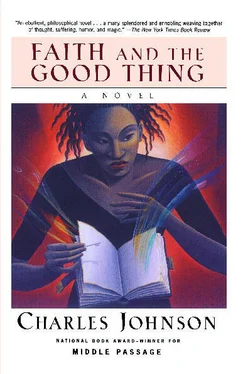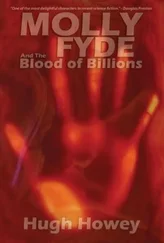Faith thought of her father, of his stunning fictions and well-meant lies. “I’ve heard different.”
“From who?” Brown sneered. “From the Swamp Woman? I’ve heard tell of the stories she tells kids stupid enough to believe them. You listen to me. Forget people like that.” Brown winced and grabbed at his right side. “Even talkin’ about her hurts me — happens every time I mention the old witch. People like her will have you believin’ in haints and hoodoo and the walkin’ dead if you let them.” Brown seized a napkin from the table and wiped the wrinkles from his forehead.
“Pray with me,” he said.
The bleating horn of Jackson’s hearse drew Faith’s attention. She went to the front porch, Brown at her heels, muttering almost under his breath, “I’ll be back tomorrow and the day after and I’ll keep comin’ back until you start showin’ some sense.”
From the doorway she leaned against the railing of the stairs and watched as the reverend sprinted through the rain to the hearse and slid onto the front of the seat beside the undertaker. It seemed impossible the dark machine in the mud held her mother. Lavidia’s deep, almost manly laughter would no longer awake her in the morning; silent was the voice that had called her from the fields. Though it was pointless, she forgave her mother for her selfishness; her will, spitefulness, and grudges; even for taking Alpha from her in the cruelest possible way. Forgiving, though, was not forgetting. Always she would remember resting her head on Alpha’s chest as they sat on the front porch of the farmhouse, painting in broad, vague outlines the possibility of a life together, only to look up and see Lavidia’s gray face scowling in the window nearby. Always she would hear her mother say, “You’ll never have no body that’ll love you like your mother did! You’ll cry for me when I’m gone.”
Lavidia lived in fear of Faith’s leaving her to a house full of memories that would become distorted and terrifying with the passage of time. Therefore, she clung to her, screened every boy that drove up to the farmhouse to visit Faith, and browbeat each with questions: “Faith’s been saved — she’s married to God,” Lavidia would say; then wryly, with squinted eye and twisted mouth: “Are you God?” Alpha found such competition unbearable. He never returned. Faith had waited for him each evening on the front porch until Lavidia informed her, “He won’t be back no more. I was payin’ him to court you ’cause you looked so lonesome all the time. Wouldn’t no other fellah look at a girl as plain and backwards as you. I couldn’t afford it no more. I guess he’s gone for good.”
It must have been a lie. Yet to this day Faith was uncertain. Others — the rowdy boys from the mill, the shy ones without a future, and the bold ones destined to die soon in fights or drink — came to the farmhouse after Alpha’s disappearance, but Lavidia never confronted them. Faith herself turned them away, excusing herself to do school- or housework, or simply hiding from them in her bedroom. Did one ever really know another’s affections? You could guess at them and live as best as you could in the shadow of uncertainty. That was Big Todd’s way. He never asked, never doubted that haints and demons inhabited everything. He told her great love and hatred moved men to happiness and shame: it was that simple.
She looked at Reverend Brown beside the mortician and saw that his smugness, his strength came from knowing or thinking he knew with his heart the workings of other men, that they lusted, or felt lost and would be rewarded or damned proportionally for those longings. But was that true? Was all that really there? Concerning his feelings, Alpha’s face told her nothing. His dark eyes were quiet, and his lips bent up at their corners whenever he saw her; but there was nothing about this, or his smooth hands, or his face and smoother words, that really told her what he was thinking. Love was a myth born in imagination, pieced together from the inferred softness of a stare, deduced, probably from false premises or undistributed middle terms, from his smile: it could have been deceit. Lavidia never ceased to make that clear when Faith found herself moping about the house. “Just how did you know he loved you?” she would challenge. No reply was possible. You could never know. And Alpha and the world of things, of kitchen furniture and hearses, came to her as cold, inaccessible things out there.
You couldn’t fool yourself; you knew you wanted the smile to be love, and knowing that you knew completely ruined the feeling. How had Big Todd done it — lived in a world so full of magic that he could call pots and pans by proper names he’d given them? Seen from the floor of Brown’s tent the world had been a wasteland; the one in Big Todd’s tales, a dream. Could you choose?
Within herself Faith found no answer.
And now the hearse was at the road, hauling her mother to the halfway house between Hatten County and Hell. She jumped down the stairs and ran slipping through the mud. Jackson stopped the car, rolled down his window, and called:
“You go and stay with Mrs. Jenkins tonight.”
They left her at the road. From the north the wind brought rain to pelt Faith. She suddenly feared reentering the farmhouse. It rested on white stones her father had carried by mule from the forest. Lavidia’s rocking chair creaked back and forth slowly in the wind. Tree toads were carping, harbingers of a storm, and the rain exploded like the report of rifles far away. Faith remained still, staring at the front porch, trying to imagine Lavidia sitting in her rocker, smoking and squeezing from the pores of her waxy nose white things she called worms. The cabin defied her memories, determined to remain. out there. Then came thunder, and in a way that frightened her — as though the noise would tear the thin membrane of the sky, rending it to the horizon like a run in cheap hosiery, and angels, God’s throne, and heavenly host would tumble like leaves across the fields. Faith began running south until she fell. She looked back, still frightened by the cabin that appeared to descend into the soft ground. Alone, she cried, but kept walking, aimlessly and for hours. Her flight took her to the edge of the swamp. Then it was that Faith decided to seek audience with the were witch at her shanty in the bogs.
Residents of Faith’s county told rumors that the Swamp Woman was the Last Gnostic and hated visitors, that she had once been a diviner of dragon bones and dodo gizzards in Nubia before the coming of the Portuguese, French, and English. They said when her tribe was pillaged and its members shaved, manacled, and driven into the ships lining the west coast of Africa, she had chosen death over captivity and made herself one of the living dead to torment her people’s captors forever from the dank swamps, cackling to herself, working hoodoo, and conversing with spirits. Those who believed in her said she was a midwife for the things hiding like tumors beneath a man’s personality; others said she guarded forgotten mysteries and formulas lost to man. But everyone in southern Georgia attributed miracles to her — like the time before the Civil War when old Massa Furguson paid her eight hundred dollars in horses and slaves to make him young again. The Swamp Woman, if the story is true, was reported to be mischievous. She slaughtered cows and sacrificed virgin slaves that entire night, and by morning the witchery was done. The old Massa awoke and pulled back the covers of his bed. He was young again. And black. His wife screamed, awakening the entire plantation. Old Massa looked in his bedroom mirror and saw that he was in the body of one of his slaves, a healthy but stupid one named Jug. When he turned around, Jug was standing in the doorway, grinning in the Massa’s old body. Jug sipped at a bottle of the Massa’s best port, sucked at his long Cuban cheroot, and gave a strong, protective arm to the Massa’s wife as defense against the raving nigger fingering his face before the mirror. That’s exactly how they say it happened. Jug sold the Massa the very next day for two new muskets and a mustang, freed all his slaves, and threw a party in the Massa’s Big House every weekend for thirty years until he died.
Читать дальше












